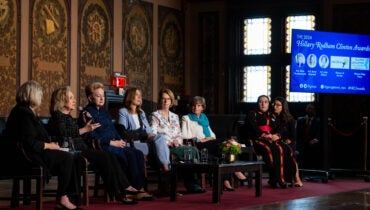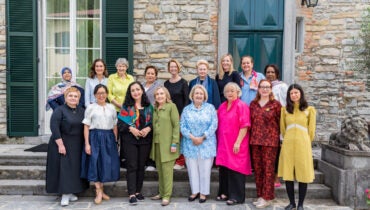As we reflect at the end of 2023, we thank you for all that you’ve made possible.
This year marked the 10th anniversary of the Georgetown Institute for Women, Peace and Security, and we continue to strive in promoting a more peaceful, equitable, and just world by focusing on how pivotal women are in preventing conflict and building peace.
It has been a difficult year around the world. Afghans, Ukrainians, Sudanese, Israelis and Palestinians are among those who have suffered deeply. In the face of the many challenges globally, we must redouble our efforts.
GIWPS is committed to strengthening the evidence-based case that women are critical to sustainable peace. We must continue to ensure that women are participating in decision-making, peacebuilding and conflict resolution, protected from violence, and involved in relief and recovery efforts after conflict.
As we look back on our year, here’s a snapshot of some ways our work made a difference.
GIWPS Spotlights
The Women, Peace and Security Index and GIWPS Research
This year we released a new edition of our flagship research product – the Women, Peace and Security Index – which ranks 177 countries on the status of women. The report shows that countries where women are doing well are also more peaceful, prosperous, and better prepared to respond to the impacts of climate change. The Index has raised awareness around issues affecting women globally through widespread media coverage and conversations with diplomats, political leaders, and academics.
The Institute has expanded its research portfolio to address emerging WPS challenges related to climate change, backlash against women’s rights, democratic backsliding, political violence against women, masculinities, and technology-facilitated gender-based violence. We published cutting-edge reports on the relationship between masculinities and peacebuilding in conflict-affected contexts in Southeast Asia, an examination of trends in women’s status over time, and a report exploring the links between women’s status and democracy. Our team of experts is also tracking conflicts around the world from a WPS perspective to shape policy and practice through real-time analysis and insights.
Peace in Northern Ireland
GIWPS organized a high-level conference marking the 25th anniversary of the Good Friday Agreement with Secretary Hillary Rodham Clinton and many of the women who played a leading role in negotiations. Irish Taoiseach (Prime Minister) Leo Varadkar headlined the event and highlighted the often-ignored impact that women peacebuilders had in the Northern Irish peace deal, helping to ‘write them back into history.’ While the situation remains unsettled and complicated by Brexit, the peace continues to hold all these years later.
War in Ukraine
Throughout the year, GIWPS championed women’s leadership in responding to Russia’s assault by ensuring the participation of Ukrainian women leaders in donor conferences and relevant international forums. We also facilitated various in-person and virtual meetings that amplified calls to action by key Ukrainian leaders, including Ukraine’s Ambassador to the United States, Oksana Markarova, a close friend of the Institute.
Ukrainian First Lady Olena Zelenska called for the world to continue to pay attention to the war in Ukraine and underscored the dire conditions Ukrainian students face during a visit to Georgetown hosted by GIWPS.
“I understand that there might be some fatigue. But to turn a blind eye would mean to turn your back to your own future,” said Zelenska. “No one can feel safe in a world where might is right, where who is strong is who is in charge.”
Advocating for Afghan Women and Girls
We continue to advocate for the rights of Afghan women and girls and work to influence US and UN policy on Afghanistan through GIWPS’ signature initiative, Onward for Afghan Women. Among other activities, GIWPS co-hosted a side event during the United Nations General Assembly High-Level Week and two special sessions at the UN Human Rights Council. We also continue to advocate for codifying gender apartheid and utilizing tools within this framework to address the Taliban’s appalling and systemic violations of the rights of Afghan women and girls.
In April, we hosted a three-day retreat for exiled Afghan women in our network whom we helped evacuate in 2021. Sessions focused on leadership and professional development, advocacy and action, and community care.
Georgetown students receive Gender, Peace and Security certificate
A dozen Georgetown students received a graduate certificate in Gender, Peace and Security, representing a new cohort of policymakers and practitioners with the practical and analytical skills to advance an inclusive approach to international affairs. We continue to expand our course offerings for graduate students–including a new spring class on the intersection of climate change, security and gender, and one on technology and WPS. In an effort to expand our course offerings, we are also excited to announce an undergraduate summer program slated to begin in summer 2024.
Addressing Climate Change
To bolster GIWPS thought leadership and influence on issues of gender, climate, and security we welcomed a senior gender and climate expert and a climate policy associate to our team. This year we convened high-level climate events and participated in key discussions with policymakers and practitioners at convenings around the world. Ambassador Verveer and four members of our climate and policy teams recently returned from the UN Climate Change Conference (COP28) in the United Arab Emirates, where they continued to drive the conversation on inclusive approaches to climate action through various programs. The team also launched our recent research on “The WPS Index and the Gender-Climate-Security Nexus,” which finds that countries where women fare better are also more resilient to climate change.
Global Women Leaders Network
GIWPS, under the leadership of Secretary Clinton, convened a group of high-level women political leaders, including former heads of state and current ministers, at the Rockefeller Foundation in Bellagio, Italy, to address the erosion of women’s political participation by forging strategies on issues ranging from online harassment and violence to authoritarian pushback. They also focused on strategies to address climate change and a rapid response system to support women in conflict-affected states.
In Solidarity with Women on the Frontlines
We continued to stand with the women of Iran and amplified their calls for “Woman, Life, Freedom” during on-campus and virtual events this year. We also celebrated Iranian human rights activist and recipient of the 2024 Nobel Peace Prize, Narges Mohammadi, whom we had the honor of hearing during a virtual event we hosted.
“I am one of those people who is very optimistic about the future of our women, peace, and human rights in our country,” said Mohammadi during a GIWPS webinar.
GIWPS also hosted events on crises facing women around the world and highlighted the important work frontline women peacebuilders are doing from Sudan to Yemen.
Georgetown Ambassadors
We remain grateful to our Georgetown Ambassadors for Women, Peace and Security, who help advance the Institute’s mission and impact. This summer, we led a delegation of Georgetown Ambassadors to Jordan for candid conversations about women’s leadership in this strategic country, the obstacles women continue to face, and successful programs to promote peacebuilding and economic opportunity.
From all of us to all of you, thank you, happy holidays, and may there be peace on earth.
Melanne Verveer, Carla Koppell, Jessica Smith, Mike Brand, Sarah Rutherford, Melissa Shields, Robert Nagel, S. Ayse Kadayifci-Orellana, Marisa O. Ensor, Elena Ortiz, Kristine Baekgaard, Jessica Anania, Christina Vetter, Lina Tori Jan, Lana Kweon, Ana Lejeva, Colleen McMahon, Alexandra Gopin, and Riya Ou.

